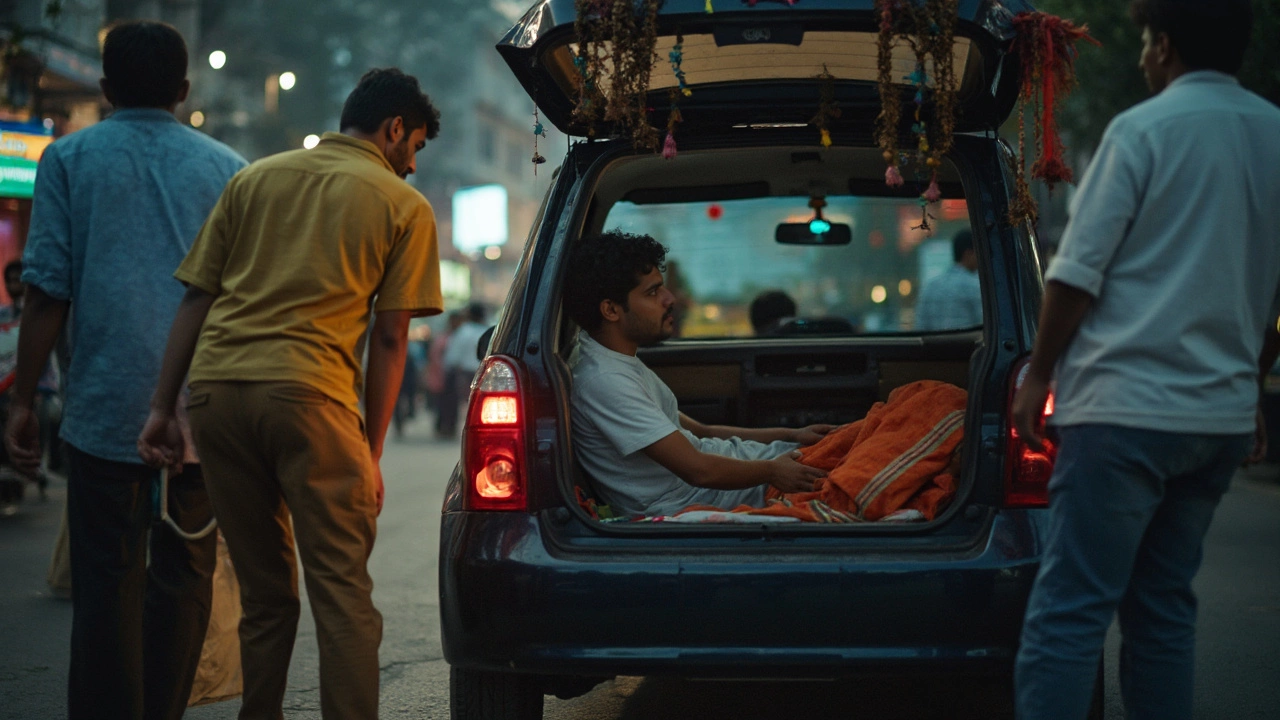So, you've found yourself thinking about sleeping in your car, huh? You’re not alone; folks do it for all sorts of reasons—maybe it’s an unexpected situation, or maybe you want to save big on lodging. But let's chat about the nuts and bolts of car sleeping.
First things first, can you legally just pull over and catch some Z's? It turns out, this really depends on where you are. Some places are super chill about it, while others might give you a hard time or a fine. It’s smart to check local rules or find designated parking areas to avoid any surprises.
Safety is another biggie. Your car might feel like this cozy little cocoon, but there are some precautions to take. Trust your instincts about where to park, and keep your doors locked. Plus, it’s wise to let someone know where you are, just in case.
- Considering the Legalities
- Thinking About Safety First
- Maximizing Comfort in Tight Spaces
- Handling Emergencies and Unexpected Problems
- Deciding If It’s the Right Choice
Considering the Legalities
When it comes to sleeping in your car, the legal landscape can be a bit of a maze. It’s not just about pulling over and snoozing; different places have their own rules. Some towns or cities might be totally cool with it, while others could hit you with a fine or even worse.
In most cases, laws about car sleeping fall under local ordinances. Some areas, especially near busy urban centers, have strict no-sleeping-in-cars policies. Other places have recognized the growing need and offer designated parking lots where you can park overnight legally. These spots are often monitored for safety, giving you some peace of mind.
There are even some national chains, like certain big-box retailers that have informal policies allowing overnight parking in their lots. It's always a good idea to ask the store manager first, though, just to be sure and polite.
A statistic that might surprise you: a recent survey showed that over 20% of urban areas in the U.S. have formal regulations against car sleeping. So, it's crucial to research local laws before you decide your car is your new motel.
If you're planning to camp out in more remote areas or on public lands, rules are different again. National parks, for instance, have specific guidelines, and you’ll typically need a permit for overnight stays, even if you're in your car.
Bottom line? Know your local laws and vehicle safety guidelines before you tuck in for the night. A little research can save you a lot of hassle—and maybe some fines, too!
Thinking About Safety First
Alright, buddy, safety's no joke when you're planning to sleep in your car. Let's get down to what really matters to keep you secure.
First up, where you park can make or break your night. Find a spot that's well-lit and away from busy roads. If you're near a shopping center or a 24-hour gym, those are usually good choices since there’s regular foot traffic, which means more eyes around. Plus, employees often do rounds, providing an extra layer of security.
Your car doors should be locked at all times. Sounds basic? Sure, but it's easy to forget when you're tired or feeling too secure. On that note, keep the windows slightly cracked for ventilation, but not enough for someone to reach in.
It's a good idea to have a plan if things go sideways. Keep your phone charged and maybe have a power bank handy just in case. Share your location with a friend or family member. Just send a quick text about where you're parked. Seems over the top? Think of it as your safety net.
Also, don't forget about the weather. If it's cold, sleeping with the engine running can be a carbon monoxide risk, and in terms of gas and environment, idling isn't the best idea. Instead, bundle up with layers. For heat, put up sunshades and keep hydrated.
Check out the table below for some things to pack that can make your night safer:
| Item | Reason |
|---|---|
| Portable phone charger | Stay connected in emergencies |
| First-aid kit | Handle minor injuries |
| Thermal blanket | Stay warm without idling |
| Personal alarm | Alert others if you feel threatened |
Last but not least, trust your gut. If a spot feels off, it’s not worth the risk. Find somewhere else, even if it’s annoying to move. You’ll rest easier knowing you’re safe.

Maximizing Comfort in Tight Spaces
Sleeping in your car isn't always the most comfortable, but there are ways to make it work. The key is to maximize what you have and bring along a few essentials to make your night as comfy as possible.
First off, let’s talk sleeping position. If you have an SUV or a hatchback, consider folding down the back seats to create a flat surface. Sedans can be a bit trickier, but adjusting the front seats back and reclining them can offer you the best stretch.
Now, on to some key items that make a big difference. Grab yourself a good sleeping bag or some warm blankets, especially if the nights get chilly. To add cushioning, use foam pads or inflatable mats. These can fit snugly, and they're lifesavers when it comes to comfort.
Don’t overlook the importance of a pillow either. A supportive neck pillow can help prevent a stiff neck, and you can easily store it when you’re not using it.
For blocking out pesky street lights or the early sunrise, consider bringing an eye mask or using sunshades on your windows. Plus, having earplugs can make a world of difference in drowning out traffic noise.
To keep things clutter-free and organized, get some storage bins for your essentials. Keeping everything you need within easy reach can help avoid unnecessary chaos.
- Sleeping bag or warm blankets
- Foam pad or inflatable mat
- Supportive neck pillow
- Eye mask or window sunshades
- Earplugs
For those unexpected temperature changes, crack a window slightly for airflow. It’s a small move with a big impact on your comfort levels. But remember, always check the safety aspect; only crack them enough for ventilation without compromising security.
By focusing on these details, you can transform your car into a albeit cozy, temporary home. It’s all about making those tight spaces work for you!
Handling Emergencies and Unexpected Problems
Life has a funny way of surprising us, especially when you're spending nights in your car. Preparing for emergencies while sleeping in your car is key. You'd rather have a plan and never need it than be caught off guard.
First up, make a list of essentials. Keep a first aid kit, flashlight, portable phone charger, and a set of basic tools handy. Even if you're not typically a "just in case" person, you’ll be glad you did if a situation arises.
Stay connected. If you find yourself in a jam, having a backup phone or a way to charge your current one is crucial for reaching out to friends or services. Don’t underestimate the power of a well-timed contact.
Car trouble? It’s important to know your car well. Regular maintenance checks can often prevent problems before they start, but who’s perfect, right? Know how to change a tire or jumpstart a battery. Stash a spare tire, jumper cables, and some emergency funds for unexpected repairs. And if you’re not sure about the state of your car, get it looked at before you rely on it as your bed for a night.
Let’s dive into dealing with weather. If it's blazing hot or freezing cold, your car's going to feel the same. Adjust by having blankets, layers of clothing, or a way to create airflow. Staying warm in the winter takes layers and maybe even a sleeping bag instead of just a blanket.
Then, there are the hiccups you can’t predict, like a sudden health issue. Know where the nearest hospital or clinic is, and have your health cards or insurance info within reach. It’s one of those things you hope stays tucked away but could really save the day.
Trouble with strangers is rare, but it's good to avoid risky situations. If anyone’s giving off bad vibes, drive away. Keep a whistle or personal alarm nearby for extra peace of mind.
Finally, have a backup plan. Know which friends or family you can turn to in an emergency. Jot down their contact info, because relying on digital storage can be risky when tech fails.
| Item | Purpose |
|---|---|
| First Aid Kit | Basic medical emergencies |
| Flashlight | Visibility in the dark |
| Portable Charger | Keeping devices powered |
| Basic Tools | Minor repairs and adjustments |

Deciding If It’s the Right Choice
So, you're wondering if sleeping in your car is the way to go? It's definitely not a one-size-fits-all answer. Let's dig into what you need to consider.
First off, ask yourself why you're choosing this option. Is it to save money, or are you in a bind with no other options? If it’s a choice to save cash, weigh this decision against possible safety concerns and legal issues. Sleeping in your vehicle might save you some bucks, but if it lands you in trouble, it could end up costing more in the long run.
Consider your own comfort levels. Cars aren't known for their spacious sleeping quarters, and they come with their own set of challenges. Can you adapt to squeezing into a small space? Maybe using a sleeping bag or air mattress can make things more bearable.
Also, think about the weather. Are you prepared for cold nights or scorching heat? Sitting in a sunbaked car is no fun. You might need to invest in things like window shades or portable fans to make your stay more comfortable.
On top of that, check if you have the means to freshen up regularly, like access to a nearby gym or community center with shower facilities. Living out of your car might limit your hygiene options, which can be a dealbreaker for some people.
Here’s a small checklist to help you decide:
- Evaluate your safety in the area you're considering.
- Check legal restrictions where you plan to park.
- Ensure a way to maintain personal hygiene.
- Prepare for varying weather conditions.
- Consider personal comfort and space constraints.
If none of these sound like big hurdles, maybe you’re on the right track. Just make sure to revisit these points if things change. Remember, your safety is the top priority, so don’t hesitate to look for other options if sleeping in your car doesn’t feel right.






